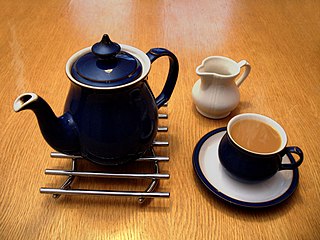
A drink or beverage is a liquid intended for human consumption. In addition to their basic function of satisfying thirst, drinks play important roles in human culture. Common types of drinks include plain drinking water, milk, juice, smoothies and soft drinks. Traditionally warm beverages include coffee, tea, and hot chocolate. Caffeinated drinks that contain the stimulant caffeine have a long history.

Fortified wine is a wine to which a distilled spirit, usually brandy, has been added. In the course of some centuries, winemakers have developed many different styles of fortified wine, including port, sherry, madeira, Marsala, Commandaria wine, and the aromatised wine vermouth.
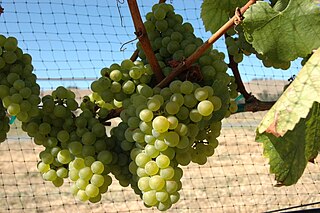
Chardonnay is a green-skinned grape variety used in the production of white wine. The variety originated in the Burgundy wine region of eastern France, but is now grown wherever wine is produced, from England to New Zealand. For new and developing wine regions, growing Chardonnay is seen as a 'rite of passage' and an easy entry into the international wine market.

Inca is a town on the Spanish island of Mallorca. The population of the municipality is 32,137 (2018) in an area of 58.4 km2.

Fruit wines are fermented alcoholic beverages made from a variety of base ingredients ; they may also have additional flavors taken from fruits, flowers, and herbs. This definition is sometimes broadened to include any alcoholic fermented beverage except beer. For historical reasons, mead, cider, and perry are also excluded from the definition of fruit wine.

A winery is a building or property that produces wine, or a business involved in the production of wine, such as a wine company. Some wine companies own many wineries. Besides wine making equipment, larger wineries may also feature warehouses, bottling lines, laboratories, and large expanses of tanks known as tank farms. Wineries may have existed as long as 8,000 years ago.
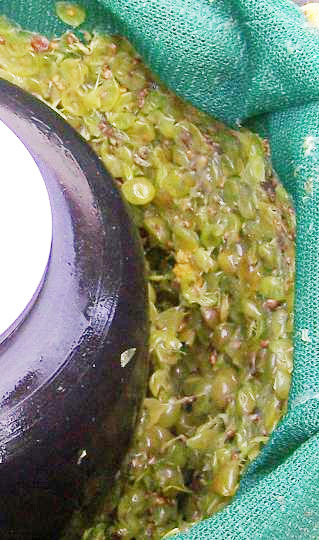
Pomace, or marc, is the solid remains of grapes, olives, or other fruit after pressing for juice or oil. It contains the skins, pulp, seeds, and stems of the fruit.
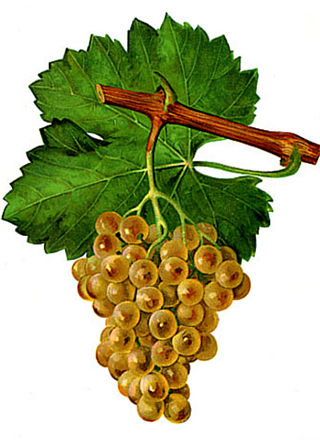
Sémillon is a golden-skinned grape used to make dry and sweet white wines, mostly in France and Australia. Its thin skin and susceptibility to botrytis make it dominate the sweet wine region Sauternes AOC and Barsac AOC.
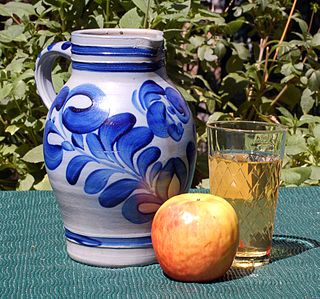
Apfelwein, or Viez or Most are German words for cider. It is made from a mix of sour tasting apples, such as "Bohnapfel" or "Speierling", respectively. It has an alcohol content of 4.8–7.0% and a tart, sour taste.

Antonovka is a group of late-fall or early-winter apple cultivars with a strong acid flavor that have been popular in Russia, including during Tsarist and Soviet times, as well as in Poland and Belarus. The most popular Russian variety is the Common Antonovka, from which other cultivars are derived. Some varieties of Antonovka were bred by pioneer Russian naturalist and plant breeder Ivan V. Michurin at his experimental orchard in the Tambov Oblast and introduced in 1888.

Winesap is an old apple cultivar of unknown origin, dating at least to American colonial times. Its apples are sweet with a tangy finish. They are used for eating, cooking, and are especially prized for making cider.

Grabouw is a town located in the Western Cape province of South Africa. Grabouw is located some 65 km south-east of Cape Town, over Sir Lowry's Pass from Somerset West, along the N2 highway. The town is the commercial centre for the vast Elgin Valley, the largest single export fruit-producing area in Southern Africa, which extends between the Hottentots-Holland, Kogelberg, Groenland, and Houwhoek Mountains. The town's population has grown rapidly, with 44 593 people in 2019 from 21 593 as listed by the 2001 census.
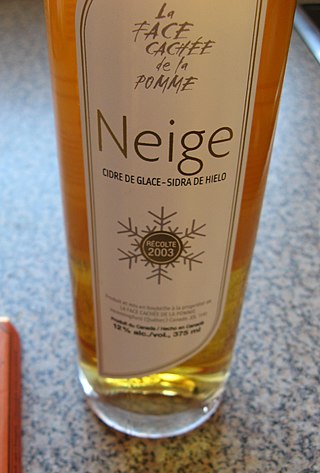
Ice cider is the cider equivalent of ice wine: a fermented beverage made from the juice of frozen apples. Similar to ice wine, the use of frozen apples concentrates the natural sugars in the apples, resulting in a higher alcohol content than cider made by traditional methods.

A sope is a traditional Mexican dish consisting of a fried masa base with savory toppings. Also known as picadita, it originates in the central and southern parts of Mexico, where it was sometimes first known as pellizcadas. It is an antojito, which at first sight looks like an unusually thick tortilla with vegetables and meat toppings.

An alcoholic beverage is a beverage containing alcohol. Alcoholic drinks are typically divided into three classes—beers, wines, and spirits—and typically their alcohol content is between 3% and 50%.
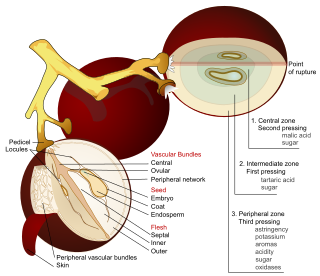
The acids in wine are an important component in both winemaking and the finished product of wine. They are present in both grapes and wine, having direct influences on the color, balance and taste of the wine as well as the growth and vitality of yeast during fermentation and protecting the wine from bacteria. The measure of the amount of acidity in wine is known as the “titratable acidity” or “total acidity”, which refers to the test that yields the total of all acids present, while strength of acidity is measured according to pH, with most wines having a pH between 2.9 and 3.9. Generally, the lower the pH, the higher the acidity in the wine. There is no direct connection between total acidity and pH. In wine tasting, the term “acidity” refers to the fresh, tart and sour attributes of the wine which are evaluated in relation to how well the acidity balances out the sweetness and bitter components of the wine such as tannins. Three primary acids are found in wine grapes: tartaric, malic, and citric acids. During the course of winemaking and in the finished wines, acetic, butyric, lactic, and succinic acids can play significant roles. Most of the acids involved with wine are fixed acids with the notable exception of acetic acid, mostly found in vinegar, which is volatile and can contribute to the wine fault known as volatile acidity. Sometimes, additional acids, such as ascorbic, sorbic and sulfurous acids, are used in winemaking.

Cider is an alcoholic beverage made from the fermented juice of apples. Cider is widely available in the United Kingdom and Ireland. The UK has the world's highest per capita consumption, as well as the largest cider-producing companies. Ciders from the South West of England are generally higher in alcoholic content. Cider is also popular in many Commonwealth countries, such as India, South Africa, Canada, Australia, New Zealand, and New England. As well as the UK and its former colonies, cider is popular in Portugal, France, Friuli, and northern Spain. Germany also has its own types of cider with Rhineland-Palatinate and Hesse producing a particularly tart version known as Apfelwein. In the U.S. and Canada, varieties of alcoholic cider are often called hard cider to distinguish it from non-alcoholic apple cider or "sweet cider", also made from apples. In Canada, cider cannot contain less than 2.5% or over 13% absolute alcohol by volume.
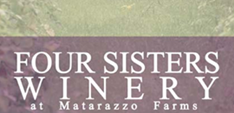
Four Sisters Winery at Matarazzo Farm is a winery in White Township in Warren County, New Jersey. A family produce farm since 1921, the vineyard was first planted in 1981, and opened to the public in 1984. It is the third oldest winery in New Jersey. Four Sisters has 8 acres of grapes under cultivation, and produces 5,000 cases of wine per year. The winery is so named because its owners have four daughters.

Cosmic Crisp is an American apple with the variety designation 'WA 38'. Breeding began in 1997 at the Washington State University (WSU) Tree Fruit Research and Extension Center in Wenatchee, Washington, and was initially overseen by Bruce Barritt. Kate Evans completed the research after Barritt's retirement from WSU.


















